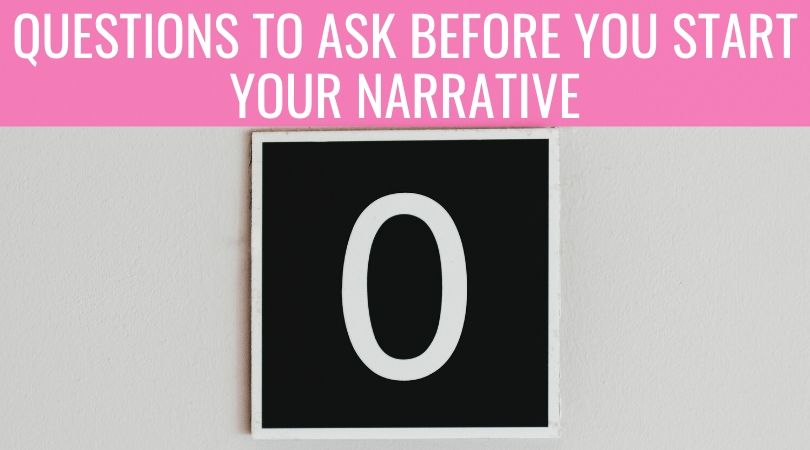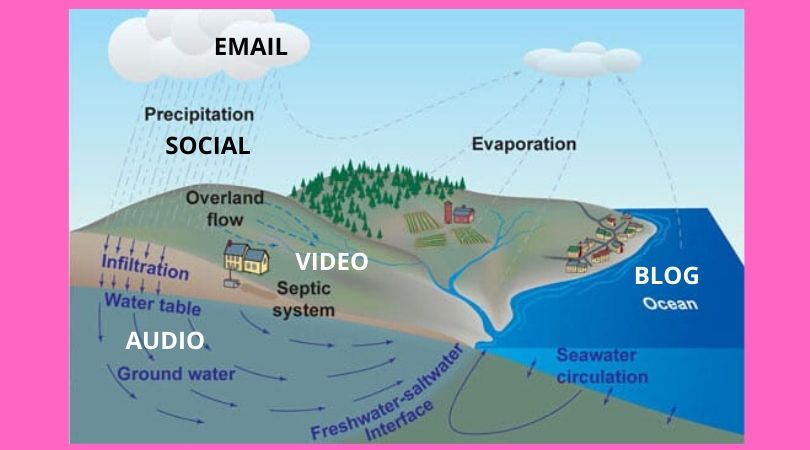Questions To Ask Yourself Before You Create Regular Content

Before you press “go” on a content-based side project and develop the narrative that will support it, you need to go through a stage where you make sure that the path you choose is the right one for you.
After all, providing lasting value is what wins the day.
This article is for you if you’re thinking about making that commitment to start producing regular content to complement your main business. We’ll be looking at the questions that’ll help you make key decisions and ensure that the thinking behind your work is strategic and on-point at all times.
Why Should You Be Creating Content At All?
The objective behind starting a regular blog on your website, or beginning a podcast or video series, is to share your knowledge and the values behind it so that you can eventually use it to build sales from your primary business.
Now is a great time to invest in developing and sharing your narrative, and start showcasing yourself as a voice within your industry. What you’ll be aiming to do is to give the content you produce a home, a central place from which it can then be adapted and replicated in a host of other places for people to engage with as best suits them.
For instance, for me, all You Are The Media activity stems from and is ignited by my blog. The blog article becomes an email, a podcast, social posts and now Zoom workshop sessions. If you do the work once, the message can be adapted and extended into different formats, multiplying the returns, building your audience and saving significant amounts of time and money. The platforms are there in front of you so it’s a case of digging deep and bringing people to you.
Read this article on creating your own content ecosystem, it does work.

By having a message you regularly share (and doing so in an engaging way), you’re demonstrating the value implicit within your main business without being salesy or distracting from the helpful and/or entertaining content your audience is enjoying.
What Motivates You?
Is there something you’ve identified that hasn’t yet been documented, commented on or highlighted in your industry?
Perhaps you think that the media landscape is overrun with similar sounding messages and you’ve got something new to say? Perhaps you recognise that there is such a thing as organic growth (people coming to you) without your needing to allocate a large amount of money to SEO or Pay Per Click advertising where businesses are reduced to dogs fighting over a bone.
A Dozen Questions To Ask Yourself At The Start (And Keep Coming Back To)
One of the most important things to recognise when it comes to creating your message and distributing your content, is that there are no shortcuts.
In order to fully understand what makes your message relevant and why people should care, get into the habit of continually referring back to these dozen questions:
Why do you want to do this?
Ask yourself what you’re looking to achieve in the long term. Is it to be held in higher regard within your marketplace? Do you want to become recognised as an industry spokesperson or attract bookings as a speaker? Is it to become better connected? Is it to build a legacy beyond merely promoting your business? This will become the ‘thing’ you return to when you’re feeling dispirited or find yourself losing momentum.
How will it relate to your core, primary business?
Addressing this question won’t make you overly commercial or salesy in your approach, rather it will help shape what you become known for.
Who is this aimed at?
Don’t think, “if we build it, they will come” – what you’re looking for is to be relevant to the right people. The amorphous “everyone” is never a target audience. Think instead about who you’re doing this for, who you’re looking to attract, and then shape your narrative around their needs. Is it just for those people you already sell to, or could your message have a wider resonance and build a bigger audience?
Are you the person or company that’s ready to speak up?
This comes down to having the guts to step up and share when others may not have yet done so, eg a charity daring to be vocal about the challenges facing the entire sector, or an accountancy firm that’s prepared to share less well-known workarounds and initiatives.
Sometimes, the most uncomfortable topics are the ones that are crying out to be explored further as they’re the ones that will resonate more deeply with your audience. Ask yourself, whether you’re prepared to go beyond run-of-the-mill content that only focuses on the well-worn paths of business wins and repeating general, sector-wide news.
Why should people care?
Find a way to bring you and your audience together through recognising the values you both share. The more you lean into these, the easier it becomes for others to recognise that your content comes from a trusted space. One of my favourite quotes is from Theodore Roosevelt, “People don’t care how much you know until they know how much you care.”
Do you need this in your life?
Are you prepared to put the time and energy into building and growing this ‘on the side’ initiative?
It can become all-consuming and overly time-consuming if you don’t really know who you’re talking to and worry about a lack of topics or themes to cover (read eight themes you can cover here) which is why it’s so important to be be rigorous in answering these questions.
In the early days of YATM I struggled with working out my voice, but once I’d done this, content production did start to flow.
What is going to make you different?
The problem with your marketplace is not just that it’s noisy, it’s that all the noise is pretty much the same. How are you going to distinguish yourself? Will it be in the way you deliver? Will it be your approach, one that explains your world in a particularly resonant manner? What will make you stand out? Is it you, or the people you work with?
As Seth Godin recently shared, during April, “Next time, take the lead. Not because you have to, but because you can.”
What are the problems you’re going to solve?
As we live through uncertain times, the very act of producing content and creating something that resonates with, or helps others, is an act of empowerment – it’s a place of strength to build from. Having a list of topics and themes that are relatable to others and continually reinforce your authority will give you the encouragement you need to continue (read ideas for you here).
Are there people you can ask and test ideas on?
There’s no guidebook or blueprint to help you ensure your side project is a success. This is because every content creation journey reaps success from how unique and resonant it is.
Ask your customers what frustrates them or where their concerns lie. Addressing their issues is what can help make your voice unique and resonant. It’s all about getting people onside and recognising that you create for them and not for your own sales effort. Asking others and valuing their opinion reinforces your relationships with them and makes the back and forth easier as everyone can see they have a part to play.
Can you create faster than others?
Don’t become fixated on creating the perfect message, instead hone the ability to regularly create, distribute and bring people back to you with “good enough” content.
Having your own platform, be it email newsletter, video, podcast or blog, presents the perfect opportunity for a small business to build an audience and steal a march on big brands that are less agile and can be more constrained by directives. Read more about the importance to stop striving for perfection here.
How are you going to connect and bring people to you?
The promotion of your work is just as important as the creation.
Is there a space to which you can direct people to sign up? In a recent article I highlighted the importance of making the ask, a habit. You have to be comfortable with a follow up to new LinkedIn requests, adding the sign-up page URL on your profile and on every email you send.
Can you get into the habit of continually drawing people to your landing page? Let people know what they’ll be receiving and how they can benefit from the insights you share at every touchpoint (read more here).
Are you ready to begin?
The biggest obstacle is starting.
Beginning something without knowing exactly what it will yield can be overwhelming. Rest assured, people are not going to be coming at you with pitchforks if what you share is relevant and what you believe in, created with the audience you’re looking to attract, in mind. Take it slow, learn about one platform before tackling another, i.e. get used to blogging before you adapt and expand the blog into a podcast, video or online workshop.
Let’s Round-Up
Asking yourself these questions will mean that everything about your work – from topic to angle, audience to timing – comes together and connects, and the work you produce doesn’t really feel like hard work (or marketing).
At the very beginning focus on fine-tuning your strategy before your jump head first into tactics, i.e. producing the content.
Keep in mind how your content relates back to the business it’s eventually serving and create touchpoints for people to connect with that, as they enjoy what you’re producing. The aim is for this to be as rewarding for your audience as it is for you. It can be done.
LET ME READ THIS ARTICLE TO YOU, CLICK BELOW
Podcast: Play in new window | Download


